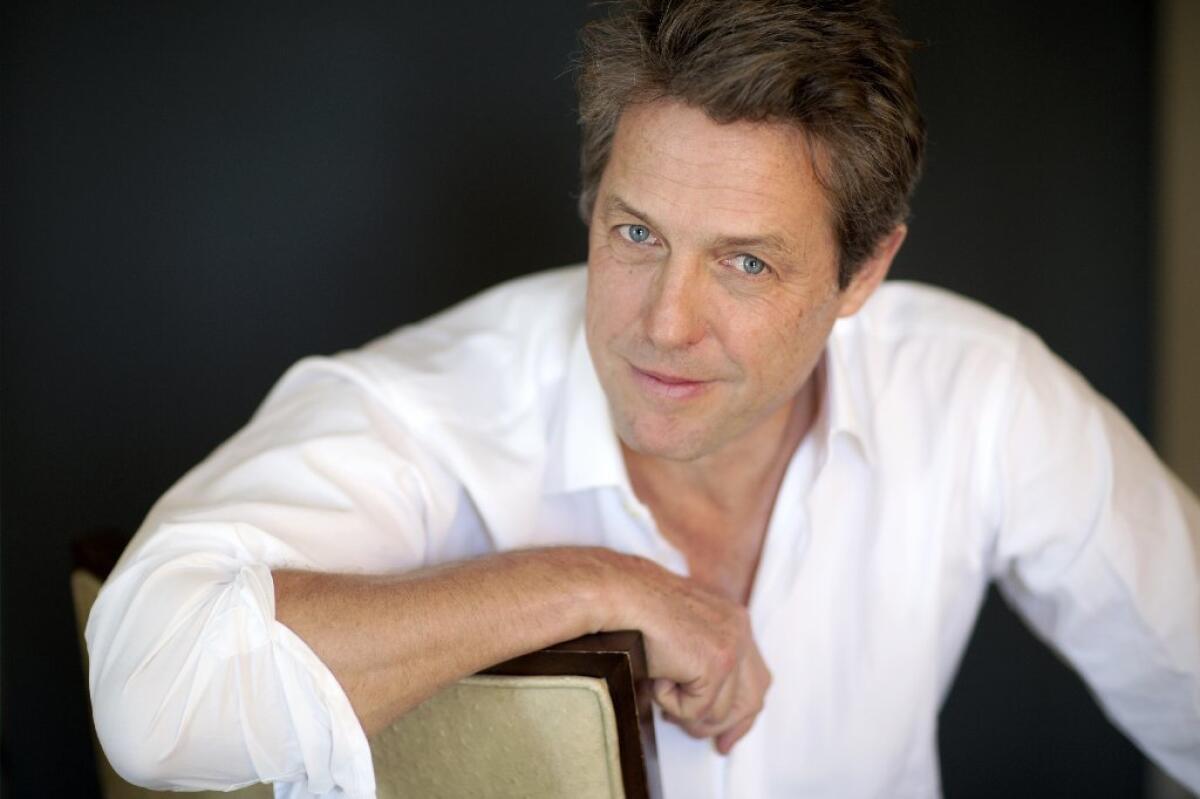Hugh Grant brings the charm — and the energy — to ‘Florence Foster Jenkins’

When Hugh Grant slides into a restaurant booth he looks tired, and rightfully so. Just four hours earlier he’d arrived in L.A. from London before the sun did, after a long day of shooting the children’s film “Paddington 2.” (“I play the villain, so as long as I terrify the kids I don’t need a lot of energy,” he says with a low-energy half-smile.) His charm and winning personality, which have seduced audiences in such romantic comedies as “Love Actually,” “Notting Hill” and his first international hit, “Four Weddings and a Funeral,” surface naturally in the course of casual conversation. Intelligent and professional with no pretensions about being as badly dressed as his guest, Grant earns the rare media compliment: He would clearly be fun to hang out with.
Now with awards season building momentum, Grant’s portrait of the common-law husband and career manager to Meryl Streep’s unlikely opera star in the summer release “Florence Foster Jenkins” is gaining attention. It’s a low-key part that’s more dramatic and oddly romantic than when he fought Colin Firth to be Bridget Jones’ main squeeze. (“Florence” debuts on DVD Dec. 13.)
Was your role difficult?
Very much so. I haven’t done a period drama for so long that I forgot how much attention is paid to costumes and hair. Usually they just say, “We don’t need that much time with Hugh, just make him look like he crawled out of the pub late last night!”
In making “Florence” what did you learn about Meryl Streep that you had previously only suspected?
As an actor she raises the bar to its highest level and you find yourself trying to meet her challenge. At times when I act I’m either overly dramatic or seem as if I’m needing sleep. Whenever I would start to enter a death-like trance, Meryl would basically snap me out of it. I learned a while ago that when it comes to acting, less is more. Working with Meryl revived my love of acting.

Watch the trailer for “Florence Foster Jenkins.”
This film is set in the 1930s and ’40s. What’s the worst part about doing period stories?
Telling the director you have to go to the bathroom — because of the costume, lots of buttons, you know, it’s more like rushing into the bathroom at an awards show than a sporting event … meaning you have to look perfect when you exit. Directors don’t want to be told that Hugh is still in the loo adjusting all his frilly things!
Can you relate to period films?
In my soul I can. In reality, I’m more of an unsophisticated gent who’s too impatient to deal with bowing to people and complimenting them on their royal gardens. I like the romanticism of the period but I always feel I’m acting when they tie up my hair or curl it and make me put on a wig.
Your characters in “Florence” are together 25 years. If Meryl Streep was single could you see the two of you being married that long?
We would last about an hour [laughs]. Simply put, I’m not the marrying kind and she wouldn’t put up with the constant test of my temperament — even though I’m not sure what that means.
Do you remember a specific moment when your career changed forever?
Well, I once took a late-night drive in Hollywood.… No, when “Four Weddings and a Funeral” came out, I went from being the shy guy in a corner seeking attention at a party to someone people wanted to party with. I suspect that moment came when I was offered roles instead of having to audition for them.
You were directed by Woody Allen in “Small Time Crooks,” what was that like?
An extremely enjoyable experience with a great, passionate filmmaker. The first thing he told me on the set was change the words if I wanted to or I could make the dialogue funnier. Woody said the screenwriter himself wasn’t worried about winning awards but only whether we could get in a few laughs before lunch.
Is your personal life a comedy or a drama?
It’s a farce! Actually, it’s a farce without a punchline. Please fill in one for me … I’m tired.


